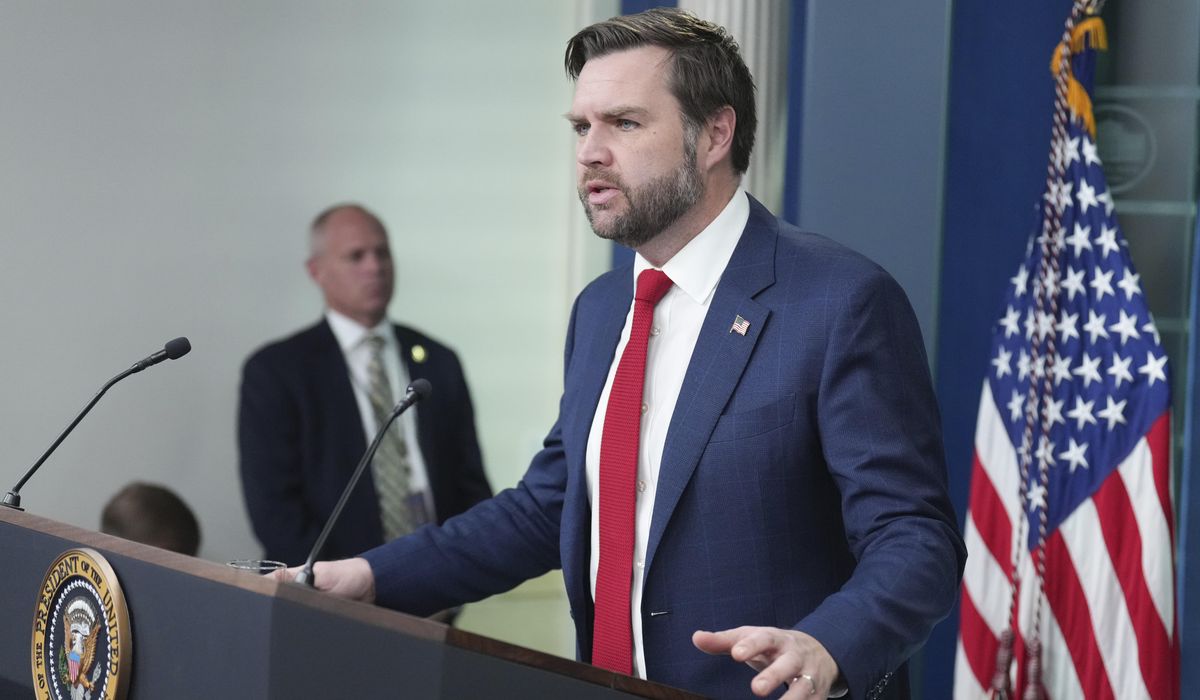

Vance says Trump administration is ‘not just restoring, but expanding’ religious freedom for America

The Trump administration will not just embrace and uphold the core American value of religious freedom but will actively expand protections for people of all faiths, while rolling back federal censorship efforts “used to prevent Americans from speaking their conscience and speaking their mind,” Vice President J.D. Vance said Wednesday.
Speaking to the International Religious Freedom 2025 Summit in Washington, Mr. Vance made clear that religious Americans have an ally in the White House. And he said that the new administration will stop using taxpayer dollars to, for example, promote atheism abroad or otherwise prop up causes that undermine religion.
“You shouldn’t have to leave your faith at the door of your people’s government. And under President Trump’s leadership, you won’t have to,” Mr. Vance said.
“The administration is intent on not just restoring but expanding the achievements of the first four years [of Mr. Trump’s leadership] and certainly of the last two weeks,” he said.
“In recent years, too often has our nation’s international engagement on religious liberty issues been corrupted and distorted to the point of absurdity,” Mr. Vance said. “How did America get to the point where we’re sending hundreds of thousands of dollars abroad to [non-governmental organizations] that are dedicated to spreading atheism all over the globe? That is not what leadership on protecting the rights of the faithful looks like, and it ends with this administration.”
Those comments were an apparent reference to United States Agency for International Development programs and other U.S. government-funded programs overseas to promote what critics say are atheist messages and other problematic causes. The Trump administration has taken dramatic steps to scale back the work of USAID amid widespread criticism from conservatives and others over the agency’s work.
Mr. Vance’s appearance at the IRF summit, its organizers said, is a powerful testament to the Trump administration’s commitment to the core values of religious liberty and freedom. He delivered his speech inside a packed ballroom at the Washington Hilton hotel to a remarkably diverse audience of people from all over the world representing numerous faiths.
On Tuesday evening, representatives from many of those faiths — Christianity, Buddhism, Islam and others — came together to each pour a glass of water into the same large bowl, symbolically “combining forces” for the principles of religious liberty. The Tuesday event was sponsored by The Washington Times Foundation and the Universal Peace Federation. It centered on what former House Speaker Newt Gingrich and others described as the ongoing “religious freedom crisis” in Japan stemming from the country’s attempts to dissolve the Unification Church and seize its assets.
’Connecting us to the sacred’
The IRF summit featured remarks from a wide range of international and U.S. religious and political leaders. It was co-chaired by former Kansas Gov. and former U.S. Ambassador-at-large for International Religious Freedom Sam Brownback and Katrina Lantos Swett, the co-chair of the Committee for Human Rights in North Korea and a former Democratic congressional candidate.
Speakers drew attention to a host of threats to religious freedom around the world today, citing pressure on religious minorities from hard-line regimes such as those in China and Iran, the plight of Christians in Ukraine and the rapid expansion of Islamic extremism across Africa.
In his address, Mr. Vance gave a clear nod to the idea that one’s faith is a key component of their connection to the broader world around them.
“One of the wonderful apparent paradoxes of religion is that in connecting us to the sacred and to the universal, it deepens our commitment … to our neighbors, to our obligations to one another, to the individual communities that all of us call home,” Mr. Vance said.
“The church was a place, and still is, where people of different races, different backgrounds, different walks of life came together in commitment to their shared communities and, of course, in commitment to their God,” Mr. Vance said. “It was a place where the CEO of a company and the worker of a company stood equal before their worship of God. … Are these not the kinds of bonds and virtues that lawmakers today should strive to cultivate? Well, I’m pleased to say that they certainly were in the first Trump administration, and they will be even more so in the second.”
Other speakers delved deeply into that idea and focused on how faith — and shared communities centered around that faith — drive human happiness and a better quality of life.
Just before Mr. Vance took the stage, a panel discussion focused on religious freedom in Africa and, more broadly, the role that faith plays in “human flourishing” for people all around the world. Byron Johnson, founding director Baylor Institute for Studies of Religion, said he is in the midst of a major, groundbreaking study on the role religious freedom and personal faith play in individual happiness and human flourishing.
“It would seem like a no-brainer that we would want to advance religious freedom. And yet a lot of people are living in countries where they’re being persecuted for their faith,” he said.
• Ben Wolfgang can be reached at bwolfgang@washingtontimes.com.
